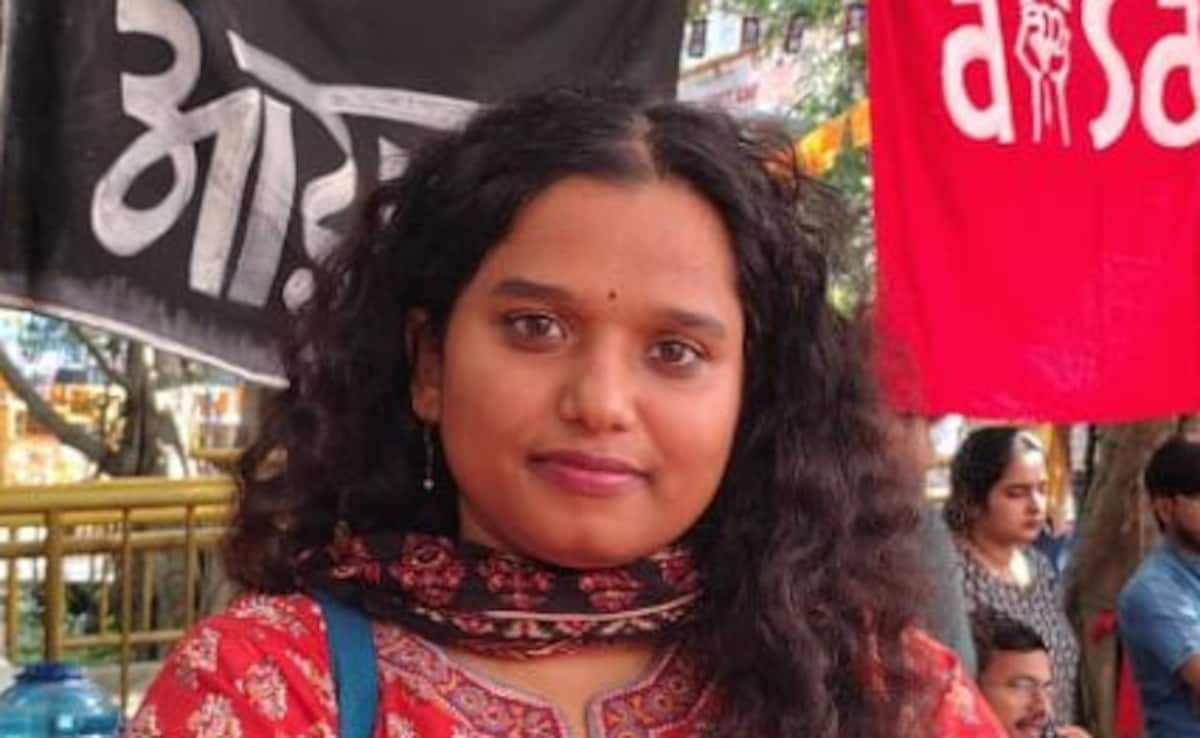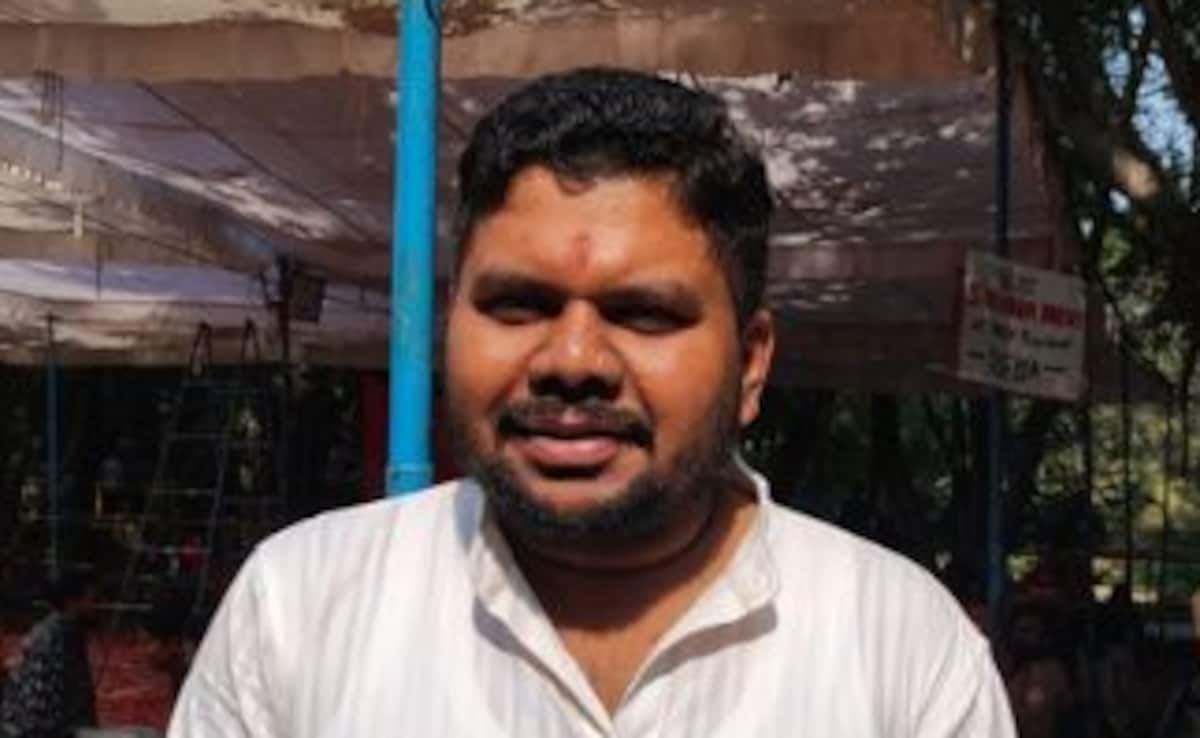
As counting continues for the Jawaharlal Nehru University Students' Union (JNUSU) elections, the Left Front has secured a clear lead in three of the four central panel posts - President, Vice-President, and Joint Secretary - while the Akhil Bharatiya Vidyarthi Parishad (ABVP) is narrowly ahead in the General Secretary race.
The Left Front's Aditi Mishra led the presidential race, followed by ABVP's Vikas Patel and PSA's Vijaya.
In the Vice-President's contest, K Gopika (Left Front) led, while ABVP's Tanya trailed. For General Secretary, ABVP's Rajeshwar held a slim lead over Sunil (Left Front).
For Joint Secretary, the Left's Danish was ahead of ABVP's Anuj.

From BHU Protests to JNU Presidential Lead
Leading the presidential race, Aditi Mishra, a third-year PhD scholar at the Centre for Comparative Politics and Political Theory under the School of International Studies, has emerged as a prominent Left-backed candidate.
Hailing from Varanasi, Mishra completed her Master's in South Asian Studies from Pondicherry University and earned a Bachelor's in Economics (Honours) from Banaras Hindu University (BHU). Her political journey began during the 2017 BHU protests over alleged sexual harassment and hostel restrictions imposed on women.
"Back then, hostellers - especially girls - faced curfews and even discriminatory food rules; non-vegetarian food was served only to men. We protested against these injustices," Mishra recalls.
At Pondicherry University, she became active during the anti-CAA and NRC protests, describing the experience as "a cultural shock in a good way" that strengthened her belief in student politics.
At JNU, Mishra has campaigned on issues of accessibility and campus democracy. She argues that "the quality of education has declined with politically motivated faculty appointments," citing "persistent water shortages, surveillance systems in hostels, and efforts to push PhD scholars off campus" as signs of structural decay.
"ABVP works with corporate funds. Education is being made inaccessible and unaffordable - they are institutionalising dropouts," she alleges, pointing to a "50% decline in JNU's funding" and a "61% cut in AICTE allocations" across technical education.
Mishra, who identifies with Left-progressive politics, also accused the Right of resisting quotas and reservation policies. "They were in the union after 10 years, had the most councillors and central support - yet what have they achieved?" she asks.
Vikas Patel: ABVP's Long-time Organiser Focuses On Transparency And Accountability
Aditi's rival, Vikas Patel, representing the ABVP, has been active in JNU politics for over a decade. A native of Uttar Pradesh, Patel joined JNU in 2014 for a BA in Korean Studies, later completing his Master's in the same field and pursuing Political Science from IGNOU.

"I've been in student politics for 11 years," he says, recalling near victories in the 2016 and 2017 councillor elections. "From 2016 onward, the Left's hold over the School of Languages has been waning, and ABVP deserves credit for it."
Patel traces his political shift to the 2016 sedition controversy involving former JNUSU president Kanhaiya Kumar. He says the February 9 demonstration that year changed his view of campus politics.
The protest was held to mark the third death anniversary of Parliament-attack convict Afzal Guru, who was executed in 2013. Patel claims ABVP's vote share has steadily grown despite "ideological targeting" by "left-leaning professors."
Between 2019 and 2022, he says he was rejected in 11 interview panels "because of ideological bias," before finally securing admission to the School of International Studies in 2022, where he later became ABVP secretary.
He has built his campaign around "corruption and accountability," accusing the administration of poor infrastructure and financial opacity. "Rs 56 crore was sanctioned for hostel renovations, yet ceilings are collapsing. Even Barak Hostel, built in 2022 for Rs 28 crore, is already in disrepair," he says, citing a JNU Buildings and Works Committee report that criticised the Central Public Works Department for "extremely slow progress" and "poor-quality repairs."
Patel, who calls the Vice-Chancellor an "opportunist," claims his candidature was cancelled last year after he filed RTIs on canteen contracts and expenditure. "A civil and criminal defamation case was filed against me by the VC in July 2024 after I questioned how funds were being used," he says.
Responding to criticism from the Left about RSS influence on campus, Patel argues: "If RSS-backed professors have been teaching here for years, why hasn't the Right ever won a JNUTA election?"
Former JNUSU president Aishe Ghosh rebuffed the claim, saying, "The absence of Right-wing representation in the teachers' association doesn't mean the RSS's influence isn't real. We've seen RSS marches on campus - this isn't imagined."
She accused the ABVP of "blaming the Left while staying silent against their own administration," adding, "If they truly opposed the VC, how many deputations have they sent to the Centre or BJP headquarters? Earlier they blamed the AAP-led Delhi government; now even Delhi is BJP-ruled. Why does corruption persist?"
Ghosh also raised concerns over "selective favoritism" in admissions, citing K Gopika, the Left's vice-presidential candidate and MA Sociology gold medallist, who was allegedly denied a PhD seat "because of her activism." The administration has denied the claim.
As counting continued on campus, Gopika mentioned, "The right talks about inclusion and bringing people together when they have done nothing but side mindlessly with the centre, it's because their politically affiliated party is in rule that they are corroding the campus. We don't have proper hostel facilities, we don't have any inclusivity on campus, we don't have proper quality of professors."
Meanwhile, Rajeshwar, leading in the race for general secretary, took a direct jab at the Left, accusing them of being disconnected from students and campus realities.
"The left has its hypocrisy, they talk about inclusion, what inclusion? Women aren't safe, women's health facilities are poor on campus, we talk of progressive politics, JNU has been stuck in time because of the Left, so we stand for change, we stand for what the people really want, they talk of far away politics, if you talk about the water issues here they'll bring up Gaza, if you bring up the condition of hostels, they'll bring up what's happening in Washington. They are far away from the people and what they need." he said.
Meanwhile, Jayant Kumar, an ABVP member from the Centre for French and Francophone Studies - whom Left groups had identified as one of the masked attackers during the January 2020 JNU violence - secured admission to a PhD in Sociology in 2023. A viral photograph from the incident showed a masked man holding what appeared to be a sledgehammer inside Sabarmati Hostel. Both Kumar and the ABVP have denied involvement.
A Tight Race Ahead
With the Left Front currently ahead in three key posts, including the presidency, and the ABVP leading narrowly for General Secretary, JNU's high-stakes election once again mirrors the national political divide over accessibility, ideology, and accountability. Final results are expected later tonight.
